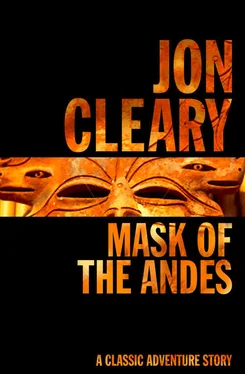Jon Cleary - Mask of the Andes
Здесь есть возможность читать онлайн «Jon Cleary - Mask of the Andes» — ознакомительный отрывок электронной книги совершенно бесплатно, а после прочтения отрывка купить полную версию. В некоторых случаях можно слушать аудио, скачать через торрент в формате fb2 и присутствует краткое содержание. Жанр: unrecognised, на английском языке. Описание произведения, (предисловие) а так же отзывы посетителей доступны на портале библиотеки ЛибКат.
- Название:Mask of the Andes
- Автор:
- Жанр:
- Год:неизвестен
- ISBN:нет данных
- Рейтинг книги:5 / 5. Голосов: 1
-
Избранное:Добавить в избранное
- Отзывы:
-
Ваша оценка:
- 100
- 1
- 2
- 3
- 4
- 5
Mask of the Andes: краткое содержание, описание и аннотация
Предлагаем к чтению аннотацию, описание, краткое содержание или предисловие (зависит от того, что написал сам автор книги «Mask of the Andes»). Если вы не нашли необходимую информацию о книге — напишите в комментариях, мы постараемся отыскать её.
Mask of the Andes — читать онлайн ознакомительный отрывок
Ниже представлен текст книги, разбитый по страницам. Система сохранения места последней прочитанной страницы, позволяет с удобством читать онлайн бесплатно книгу «Mask of the Andes», без необходимости каждый раз заново искать на чём Вы остановились. Поставьте закладку, и сможете в любой момент перейти на страницу, на которой закончили чтение.
Интервал:
Закладка:
‘Too late. Start smiling and acting feudal.’
The iron-studded front door, adorned with another mailed fist knocker, had swung open. An Indian butler in white jacket and white gloves stood waiting for them. Taber had only time to notice that the house was a large two-storied Spanish colonial building before he was ushered with McKenna into a hall that rose to the full height of the house. The walls were panelled and hung with tapestries; Pizarro, ugly and vicious, galloped round the hall in pursuit of Atahualpa; Christ, Taber thought, can’t these people recognize the real hero? Two suits of conquistador armour, helmets and breastplates, hung on rods, stood like steel scarecrows at the foot of a wide curving staircase. A balcony ran round three walls and above it the thick beams of the roof were lost in a gloom that Taber imagined had been gathering for centuries. The hall set the period for the house and the family: as McKenna had said, the Ruiz lived in the past.
The butler, silent as the empty suits of armour, led the two men down a long passage, their footsteps echoing on the tiled floor, and into a room that at once struck Taber as a museum. He guessed that there was nothing in the long, high-ceilinged room that did not have its historical value; the New World had long since become the old. But there was no time to take note of any details. Five people were gathered in front of the huge stone fireplace. McKenna pulled up sharply, staring incredulously at the girl who was smiling at him. Taber, following on, bumped awkwardly into him. I knew it, he thought, we’ve come at the right time.
‘Padre McKenna, welcome.’ Alejandro Ruiz Cordobes came forward. He was a big man, not so tall as thick; he filled his stiff-collared white shirt and his dark expensive suit so that there seemed no room for creases. He had a heavy shock of grey hair and a thick grey moustache that was like a small bar of iron laid across his upper lip. He moved with almost comical deliberateness, as if no matter where he went, he went in dignified procession. But the smile for McKenna was genuine, not the grimace of formal politeness. He had spoken first in Spanish, but now he broke into fluent but accentuated English. ‘We have a surprise for you, as you can see – t asked you to come this morning. But first we must meet your friend.’
McKenna, flustered, introduced Taber with no reference to what had happened up at the lake. Ruiz took the Englishman by the arm and led him towards the group, none of whom had moved.
‘My wife. My brother, the Bishop. My nephew – but not the son of the Bishop.’ A beautiful set of dentures flashed beneath the iron bar. ‘My son Francisco, who has just today come home from the Sorbonne. And the surprise for Padre McKenna – Miss Carmel McKenna, his sister.’
Taber would need second looks to remember the others, but he had taken in Carmel McKenna at first glance. It could have been her beauty, which was striking; it could have been the modernity of her, which, in the room and against the conservative dress of the others, was also striking. Whatever it was, she had filled Taber’s eye, made her impression on him at once. Dark-haired and finely-boned, full-breasted in her grey cashmere sweater, long thighs showing beneath her tweed miniskirt, brown suéde boots reaching to just below her knees, she looked to Taber like one of those mythical creatures he saw in Vogue , a magazine he sometimes read because he found it funnier than Punch. Perhaps she was too full-breasted, too sexual, for that unconsciously sexless magazine; she was certainly too sexual for her present surroundings. Taber, irrationally, suddenly prudish, felt embarrassed for the Ruiz, embarrassed particularly for McKenna.
Carmel McKenna gave him a quick smile and a nod, pushed past him towards her brother. ‘Terry darling! God, it’s good to see you!’ Her voice was deep, but too loud, one that had been trained at cocktail parties. She grabbed her brother by the elbows. ‘Do you kiss a priest hello, when he’s your brother?’ Still holding McKenna by the elbows, she looked over her shoulder at the others. ‘I was in Rome in June – you know what the joke there was? Priests and nuns can kiss each other hello so long as they don’t get into the habit.’
She’s trying too hard, Taber thought: this room was no place for swingers. What the hell was she trying to prove? That San Sebastian was out of touch with the real world? But the Ruiz family was unconvinced or shocked: it was impossible to tell: their faces were as stiff as those of their Indian servants. McKenna did his best to cover up his sister’s gaffe. He leant forward, kissed her on the cheek and said, ‘I heard that one my first year in the seminary.’
Bishop Ruiz, as thick-bodied as his brother but bald, suddenly smiled, taking the tension out of the room. ‘We joked a lot when I was a young priest. Now—’ He spread a regretful hand, the ring on his finger glistening like a large drop of dark blood. There’s dark blood in all of them, Taber thought, remarking the high flat cheekbones in all four of the Ruiz men; they might dream of Spain long ago and of the conquistadores, but somewhere in the family’s history a Ruiz had been conquered by an Inca. The Bishop looked at Taber. ‘Do the bishops joke in England, Senor Taber?’
Taber was about to say that the bishops in England were a joke, but he checked himself. ‘I couldn’t say, sir. It’s quite a while since I swapped jokes with a bishop.’
Taber saw McKenna’s quick amused glance. And for the first time Carmel looked at him with interest. She raised an eyebrow and half-smiled, as if by some intuition she had understood that he was not a lover of bishops nor what they stood for. Then she put her arm in her brother’s and drew him towards Francisco Ruiz.
‘Pancho and I met at a party in Paris. When he said he came from Bolivia I at once thought of you. How long is it since we saw each other – four, five years? I called Mother and when she said you were near San Sebastian, I just had to come down here with Pancho—’
‘We are very happy to have Francisco home with us,’ said Romola Ruiz, with just enough emphasis on her son’s name to hint that she preferred it to the diminutive. She was a slim woman who had so far won out over the creeping erosion of middle age; there was no grey in her brownish-blonde hair and her handsome, rather than beautiful, face showed no trace of lines nor any vagueness along her jawline. She looked a woman who would have her own opinions and Taber guessed there might often be a clash of wills between her and her husband. ‘Where do you live, Senor Taber?’
‘Where FAO sends me, senora.’
‘You do not have a home in England?’ The Ruiz family and Carmel had been drinking coffee and now the butler brought cups for Taber and McKenna. Romola Ruiz poured from the big silver pot that looked as old as the rest of the room’s furniture.
‘My parents are dead, so their house is gone. And I’m unmarried.’ Or twice divorced, if you like; but he did not say that. He did not think the Ruiz would have a high opinion of divorce, especially with a bishop in the family. He tried for some graciousness, lying like a diplomat, which he was in effect but which he often forgot: ‘You have a beautiful home.’
Romola Ruiz surprised him: ‘It could be modernized. Museums are not for living in.’
‘This house is the continuum in our family,’ said her husband. He sat in an upright, leather-backed monk’s chair, one that had for three centuries supported Ruiz men in the same uncomfortable way. Taber guessed that few Ruiz women would have sat in it and certainly not Romola Ruiz. ‘It was built in 1580. The history of our country has passed through this room.’
‘My family came to San Sebastian only in 1825,’ Romola Ruiz told Taber. ‘Our house fell down in 1925. They don’t build them like they used to.’
Читать дальшеИнтервал:
Закладка:
Похожие книги на «Mask of the Andes»
Представляем Вашему вниманию похожие книги на «Mask of the Andes» списком для выбора. Мы отобрали схожую по названию и смыслу литературу в надежде предоставить читателям больше вариантов отыскать новые, интересные, ещё непрочитанные произведения.
Обсуждение, отзывы о книге «Mask of the Andes» и просто собственные мнения читателей. Оставьте ваши комментарии, напишите, что Вы думаете о произведении, его смысле или главных героях. Укажите что конкретно понравилось, а что нет, и почему Вы так считаете.












